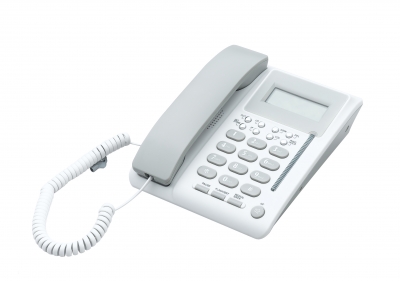
In today’s device-driven society, you’d be hard-pressed to find an adult who doesn’t own a smartphone. Smartphones are useful devices that do amazing things and make life and business run more efficiently. Despite their incredible uses, the smartphone still hasn’t been revolutionized to solve every business need. To answer the question, yes – business phone lines, such as VoIP, are still very much a business necessity.

While smartphones are great for individuals and a great way for salespeople to keep in touch, they’re not suited for offices and interoffice (or factory, lab, etc.) communications. Smartphones are less reliable than dedicated phone lines, less secure, and far more expensive. In fact, if you check out this list of VoIP facts, you’ll see that there are no additional costs for unlimited calls, including long distances. Business lines are simply a better choice for a company because they can be networked to work together, and are more economical in terms of cost.
Landlines in Office Buildings
It’s still true today that nearly all office buildings use a business telephone system. Whether it be a doctor’s office, law firm, car dealership, or any other type of business operating in an office, you always see traditional phones. Offices choose to rely on these methods, rather than smartphones, for a variety of reasons.

First, if you are running a business, then it is imperative that your office have the ability to make and receive calls reliably. The last thing you need is a potential client or customer calling your office and finding it difficult to reach anyone when they need them. In terms of reliability, business phones are superior to smartphones. After all, anyone who uses a smartphone has experienced the frustration of poor call quality or dropped calls.
Another key advantage of dedicated phone lines is that they’re always in service regardless of environmental problems. With VoIP, the signals are digital and can often function without power lines; instead, cables are sometimes run under the ground which protects them from bad weather and environmental issues. VoIP installation is also very simple and can be done in a short amount of time, with no prior experience necessary.
Another great feature is that VoIP is more secure than smartphones. Smartphones are simpler to hack and have had problems with their wireless signals being intercepted, placing the privacy of calls at risk. For this reason, nearly all financial institutions prefer to use a traditional line when discussing accounts, security, and other sensitive information. This security concern is particularly significant with businesses because they’re responsible for safely handling a large volume of sensitive information.
Understanding Business Phone Systems
Businesses rely on phones for reasons beyond reliability and security. As previously mentioned, VoIP is less costly than smartphones. Part of the reason for this cost difference is that a business’s traditional phone line is typically tied to the business’s Internet system. From a financial standpoint, it makes sense to just have one provider for both Internet and phone service; especially, when you consider the cost of providing smartphones (which are easily damaged) to every employee in a large business.
And since a business phone line connection will be needed for high-speed Internet anyway, it only makes sense to bundle the cost of phone service. When you also consider that they have no charge for receiving calls, whereas many smartphones do, you’re truly understanding just how cost-effective business phone systems are when compared to smartphones.
Have your phone system packaged with your Internet system; this can be helpful in terms of maintenance. Large businesses and offices that use larger systems to house their phone and Internet systems also have an IT department. The maintenance of the system can be handled in-house, which allows any problems with service to be solved more quickly than they would if addressed with customer support or a smartphone provider.